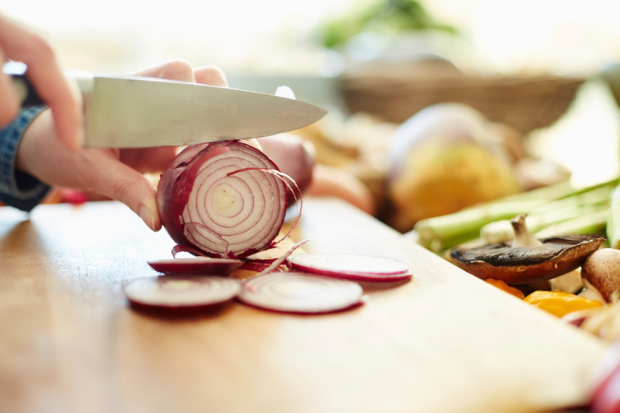Myth Buster Can Placing Raw Onions In Socks Really Cure Illnesses? Or Is The Method A Myth?
Footfiles explores the age-old idea that placing raw onions in your socks while you sleep can ward off bacteria, foot odor, fever, toxins and even cure a cold or flu.
They say you can do anything with an onion: Sauté ‘em, bake ‘em, fry ‘em, you name it. And believe it or not, millions of people believe placing onions in socks even has the power to cleanse toxins from the bloodstream and ward off illnesses like fever, colds and the flu. But where would they get this idea? And does the age-old method of placing onions on your feet to cure infections actually work? Considering thousands of people search for the onions in socks cure each month, we decided to find out.
Where The Onions In Socks Folklore Began
Scientists don’t refute that onions have major health benefits when consumed as part of a balanced diet. Nutrition data shows that they’re rich in dietary fiber, potassium, manganese and vitamins C and B-6. Meanwhile, WebMD writes that onions and onion supplements are suitable aids for blood circulation problems, diuresis, digestion issues and heart health. But a centuries old concept suggests onions may have even more power outside of the body rather than in, as they could have the ability to absorb toxins from the body and cure numerous infections if sliced and placed inside a pair of socks and along the soles of the feet of a person sleeping.
The National Onion Association has traced the onion healing myth back to the 1500s, when it was thought that “placing a cut raw onion in rooms throughout a residence could protect its occupants from getting the bubonic plague.”
RELATED: Study Proves You Can Taste Garlic With Your Feet — Here's Why
The site says that “long before germs were discovered, the dominate belief was contagious diseases were spread by miasma, or ‘noxious air,’” that onions absorbed. The miasma theory was rendered obsolete in the 1800s, when germ theory replaced it. But remnants of the onion’s legacy remain today, one being that the mighty vegetable really does have “cure-all” powers.
The Modern Day Onion Theory
Nowadays, the supposed healing power of onions is being thought of in an entirely different way than in the 1500s. The growing popularity of Traditional Chinese Medicine (TCM) has many believing that the body is made up of meridians, which are pathways from certain access points on the body to your internal organs. It is believed that slicing an onion and securing the slices to the bottom of the feet via a pair of socks can open up the numerous meridians located on the bottom of each foot, allowing the onion to draw out toxins, bacteria and sickness from the body, as well as purify the blood in the bloodstream and eliminate foot odor. The theory that onions soak up germs has become so persuasive, many believers are afraid to eat leftover onions used during cooking because they are thought to absorb bacteria and viruses in the surrounding environment and become toxic to ingest.
The Verdict: Can Placing Onions On Feet Really Cure Infections?
The onion theory has a lot of support in the alternative medicine field, but there has been no concrete proof that onions have the ability to rid the body of infections and cure fevers, colds and flus. In fact, many experts have weighed in, further debunking the onion healing theory.
Joe Schwarcz, director of McGill University’s Office for Science and Society, responded to a 2012 chain email that hailed the onion-sock method and further spread the belief that leftover onions absorb toxins and are therefore inedible.
He claims: “The fact is that onions are not especially prone to bacterial contamination. In fact, quite the opposite. Onions feature a variety of sulphur compounds that have antibacterial activity. ... Furthermore, cutting an onion triggers the release of enzymes that initiate a chemical reaction producing propenesulfenic acid, which in turn decomposes to yield sulphuric acid ... sulphuric acid also inhibits the growth of bacteria. Also, a cut onion’s surface dries out quickly, reducing the moisture that is needed for bacteria to multiply. And of course, to have bacteria multiply, you need some source of bacteria in the first place. Where would these come from? Bacteria are not spontaneously generated. They have to be somehow present to start with. Cutting boards and dirty hands are a possible source, but food spoilage bacteria do not become airborne, you need contact."
Meanwhile, Dr. Ruth MacDonald, chair and professor of the Department of Food Science & Human Nutrition at Iowa State University, concurs with Schwarcz’s theory, stating, “Onions do not absorb bacteria. The idea that a vegetable would attract and suck into itself bacteria from the air is not even logical. The onion may turn black because it would eventually rot from both cell breakdown events and bacterial contamination if you left it out, not because it absorbs germs. ... Eating these vegetables provides antioxidants that can have health benefits, but they are unlikely to prevent or cure disease."
Despite these opinions and many similar thoughts from experts in the medical field, the onions in socks theory still has plenty of support, with thousands of everyday people lauding the veggie’s healing effects. Whether or not it’s simply a placebo effect remains to be confirmed. And that might make a wannabe believer cry more than slicing on onion.
Notice concerning medical entries:
Articles having medical content shall serve exclusively for the purpose of general information. Such articles are not suitable for any (self-) diagnosis and treatment of individual illnesses and medical indications. In particular, they cannot substitute for the examination, advice, or treatment by a licensed physician or pharmacist. No replies to any individual questions shall be effected through the articles.







